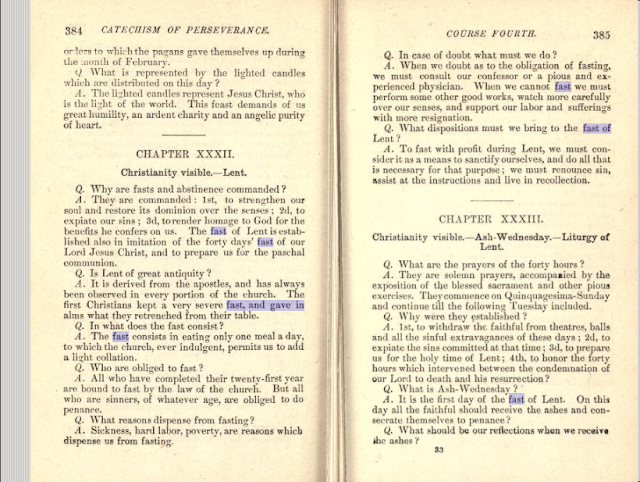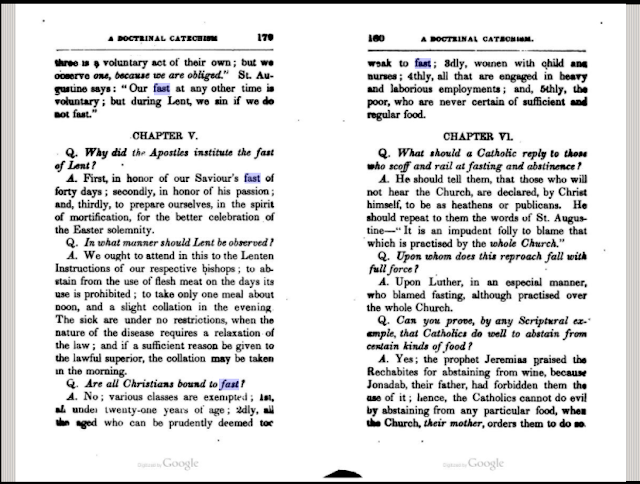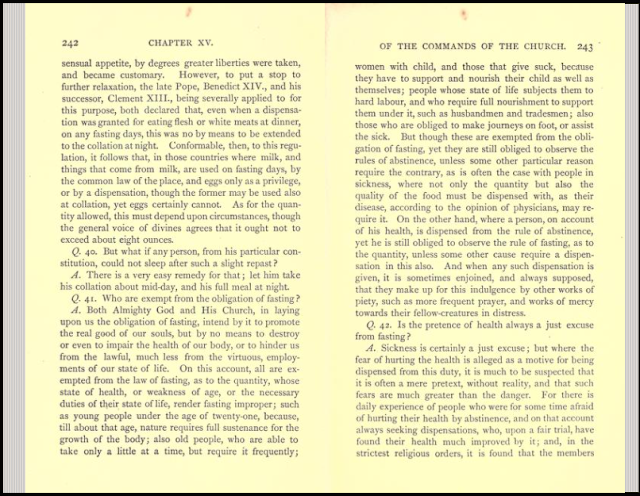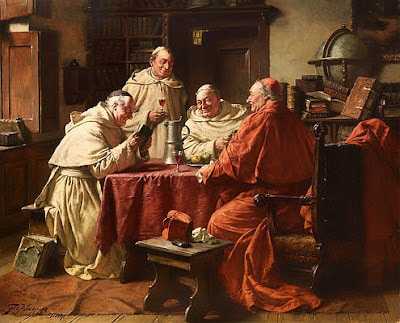While we have lost so much of our heritage with the collapse of Catholic fasting and abstinence, especially in Lent, which is the very « badge of Christian honor, » there are still some who try to excuse themselves from the minimal amount required. And there are others who, in their zeal to restore the older discipline, do too great an injury to themselves. It is, therefore, a good question to ask who is rightfully dispensed from the law of fasting and abstinence. Do manual workers have to fast? Do pregnant women have to fast or abstain? The question is worth considering in light of the Church’s clear teaching in past times.
The Law of Fasting is Distinct From the Law of Abstinence
To start, some basic definitions are in order. First and foremost, there are two laws affected by this question – namely, the law of fasting and the law of abstinence. These are distinct. You may be dispensed from one but not the other.
Fasting refers to how much food we eat. It means taking only one meal during a calendar day. The meal should be an average-sized meal as overeating at the one meal is against the spirit of the fast. Fasting generally means that the meal is to be taken later in the day. Along with the one meal, up to two snacks (technically called either a collation or frustulum) are permitted. These are optional, not required. Added up together, they may not equal the size of the one meal. No other snacking throughout the day is permitted. Fasting does not affect liquids, aside from the traditional Eucharistic Fast, which is a separate matter.
Abstinence in this context refers to not eating meat. Meat refers to the flesh meat of mammals or fowl. Beef, poultry, lamb, etc, are all forbidden on days of abstinence. Abstinence does not currently prohibit animal byproducts like dairy (e.g. cheese, butter, milk) or eggs, but in varying times past, they were prohibited. Fish is permitted along with shellfish and other cold-blooded animals like alligators, though there was a time these two were not permitted. In times past, days of fasting were always days of abstinence as well; however, not all days of abstinence were days of mandatory fasting.
Partial Abstinence refers to eating meat only at the principal meal of the day. Days of partial abstinence do not permit meat to be eaten as part of the collation or the frustulum. Partial abstinence started only in 1741 under Pope Benedict XIV as a concession and as part of a gradual weakening of discipline. Beforehand, days of abstinence were days of complete abstinence. Partial abstinence ceased being part of Catholic practice when it was removed in the 1960s.
Hence, fasting refers to the quantity and frequency of eating. Abstinence refers to what may or may not be eaten.
Who is Exempt From Fasting?
While the earliest catechisms ever made (i.e. the Catechism of the Council of Trent and the Catechism of St. Peter Canisius) do not mention fasting regulations, subsequent catechisms even centuries ago did.
The Catechism of Perseverance (1849)
Thus the Catechism of Perseverance notes the following are exempt from the law of fasting: the sick, those in « hard labor, » and those in poverty. Likewise, the Catechism notes that the law of fasting binds starting at 21 years of age, so those under 21 were not bound to fast either.
Yet for those classes of people who were dispensed from the law, the Catechism adds: « When we doubt as to the obligation of fasting, we must consult our confessor or a pious and experienced physician. When we cannot fast, we must perform some other good works, watch more carefully over our senses, and support our labor and sufferings with more resignation. » Hence, those who were dispensed were not free to go about their day as usual. They were to spend sufficient time on other good works, and besides fasting, the other two chief good works are prayer and almsgiving. Hence, the poor were enjoined to pray to a much greater degree.
Fr. Stephen Keenan’s Catechism (1846)
Bp. George Hay’s Catechism (1781).
Hay’s Catechism from 1781 contains the oldest mention of the age of fasting in an English-language catechism. Bishop Hays mentions those exempt from the law of fasting include those under age 21, the old who « are able to take only a little at a time but require it frequently, » both pregnant and nursing women, those who are subjected to hard labor such as « husbandmen and tradesmen, » those who are obliged to travel on foot.
Bishop Hay counsels for these classes of people: « But though these are exempted from the obligation of fasting, yet they are still obliged to observe the rules of abstinence unless some other particular reason require the contrary, as is often the case with people in sickness, where not only the quantity but also the quality of the food must be dispensed with, as their disease, according to the opinion of physicians, may require it. »
Pregnant and Nursing Women Are Exempt From Fasting, Not Abstinence
Based on these catechisms, both pregnant women and nursing women were exempt from the law of fasting but not the law of abstinence. Unfortunately, the United States Conference of Catholic Bishops stated the following in their Lenten regulation guides in recent years, showing that the editors have conflated the law of fasting and abstinence as too many people do:
Those that are excused from fast and abstinence outside the age limits include the physically or mentally ill including individuals suffering from chronic illnesses such as diabetes. Also excluded are pregnant or nursing women.
Unless a traditional Catholic priest and a competent physician – ideally one who understands the sacredness of Friday abstinence – advise her not to abstain, a pregnant woman should not excuse herself from the law of abstinence on Fridays. Such a practice is not part of the Church’s tradition. The Church requires only one day a week to abstain from the flesh meat of mammals and birds. Meat is, after all, not medically necessary.
Conclusion
Therefore, the Church traditionally notes as exempt from fasting the following groups of people:
- Pregnant Women
- Nursing Women
- Manual Laborers who would be physically unable to work given the strictness of fasting
- Those who are seriously ill – not those with minor allergy symptoms or basic colds but those with true medical conditions (e.g., cancer, diabetes, the flu, etc.). It should also be noted that the poor diet of many in countries like the United States often falsely causes people to feel that they are ill with a blood sugar issue when it really is just a poor diet. Those who believe they are exempt from the law of fasting due to legitimate sickness should speak with a component physician and a priest.
- The elderly, which presently starts at age 60.
- Those under the age of fasting, which traditionally began at 21 but is now 18 (though in the Middle Ages, it began at age 10)
Even if someone is exempt from the law of fasting, such an individual is bound to make up for the dispensation with fitting acts of piety and other good works (e.g., prayer and almsgiving). And to prevent scandalizing others, they should not eat in a place where others may see and thus become scandalized.
As to abstinence, unless truly medically necessary (which is not medically the case), there is no exemption from the law. Those who are exempt above from fasting must still observe the law of abstinence. And since modern law mandates only abstinence on Fridays, there is no medical reason why a person can not refrain from meat one day a week when other nutritious and iron-rich foods like fish remain permissible. There are also iron supplements for those with anemia and vitamins and minerals that can serve as supplements for various needs, both those with legitimate health conditions and those who want protein-rich diets for sports or aesthetic reasons.







